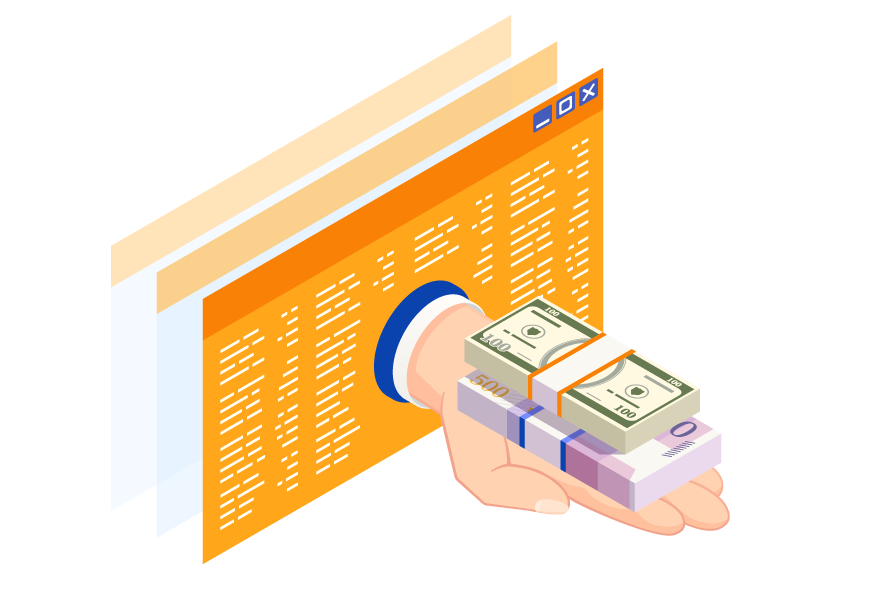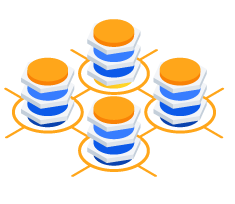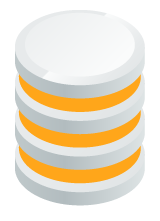
A blockchain is a digital ledger that stores mostly monetary-related data. It’s a decentralised system that helps a variety of businesses operate without the constant worry of being hacked. Naturally, many people wonder why they should switch to this system, instead of using the already established database as a way of keeping records.
Granted, a blockchain ledger boasts many advantages, but it’s still evolving. Therefore, it isn’t a go-to solution in all scenarios.
In this entry, we’ll examine what blockchains are, their advantages, and most importantly – when to use a blockchain.
What Is a Blockchain?
To reiterate, a blockchain is a digital ledger that keeps a record of large amounts of monetary-related data. To paint a picture, it stores global data on heaps of servers while remaining decentralised.
The distributed blockchain is a ledger of transactions. Although thousands of people have access to the data, there isn’t a central figure. No individual or institution has the authority to validate transactions.
As the name suggests, a blockchain gathers data in blocks. However, these blocks don’t have unlimited storage capacity. Therefore, when there’s no more room for data, a new block is formed. Each new block gets chained to the previous block, thus creating a blockchain.
This organisation of data is also valuable for keeping track of the timeline. In the main, each new block stores information about when it was created or edited. With this kind of system, records are rarely corrupted, let alone lost.
When it comes to blockchain infrastructure, it consists of several nodes. They are the core of this technology, without which access to a blockchain wouldn’t be possible. Each blockchain node participates in compiling a blockchain database by verifying new information.
How Does a Blockchain Work

As mentioned above, a blockchain ledger consists of numerous blocks of data. Once this data gets inside the block, it’s virtually impossible to tamper with it. Each of these blocks consists of the hash of the previous block, data, and the hash itself.
Furthermore, each hash in a block is unique, like a fingerprint. When new data is added to a block, this creates changes in the hash, making it easier to track any activities. For example, if hackers get access to a block, there will be changes in its hash. Moreover, each block attached to the hacked block will contain some changes in the hash.
While this system is useful for preventing possible tampering, it isn’t enough. That’s why a blockchain ledger has an algorithm called proof-of-work that can help detect any malevolent actions. This mechanism on which Bitcoin relies calculates how much time it takes for a block to be added to a chain. Put simply, interfering with one of the blocks means that you’d have to tamper with other blocks as well.
Finally, with the proof-of-work in place, an individual can’t take over this digital ledger, because it would require the use of costly machines.
Why Should You Use a Blockchain

Now that you’re equipped with all this knowledge about a blockchain distributed ledger and how a blockchain database works, you might wonder why you should use one. And what are the benefits?
Improved Efficiency
One of the main reasons companies choose a blockchain ledger for their operations is increased efficiency. Because a distributed blockchain can be decentralised by nature, companies can proceed with their activities and tasks without a middleman. And let’s be honest, middlemen are expensive and time-consuming.
For example, in the case of real estate and payments, standard transactions can take a long time. But with a blockchain, transactions are much faster because of the use of digital currency. It reduces the need for expensive administrative tasks and helps the business save significant amounts of money.
Furthermore, a blockchain doesn’t mind if it’s after working hours or a holiday. It never goes on vacation. Any transaction can go through whether it’s a weekend or a weekday. Instead of waiting for Monday to see assets in your account, it will happen in a few moments, even if the transfer took place on a Friday afternoon.
Better Security

Remember those blocks as proof-of-work we mentioned before? These make a blockchain distributed ledger much more secure than other similar record-keeping systems. This unique data storage mechanism makes it inherently impossible for hackers to access, especially without getting noticed. If one block is hacked, the system will automatically detect this. So the chances of hackers getting to a blockchain database are quite slim.
This security level is what allows a distributed ledger to be transparent, which brings us to the next reason why you might use a blockchain.
More Transparency
Transparency is one of the core features of a blockchain distributed ledger. It’s a useful solution when individuals want to keep records of land rights such that the information is accessible to anyone who needs it.
In businesses, transparency allows for more accountability. Each member of a company can be held accountable should they try to tamper with data or use the wrong data.
With transparency as one of the underlying features of blockchain, every company can ensure every sector is doing what’s best for the business and clients.
Data Saving
With a blockchain distributed ledger, it’s virtually impossible to lose any kind of data, as it’s spread worldwide. Businesses often deal with a data breach, so having this kind of technology significantly reduces the risks.
Better Traceability

Remember those blocks from before and how they contained information about their creation and possible changes? This allows more insight into a blockchain database and helps industries trace interactions from the beginning to check for any potential alerts.
For example, blockchain is a huge deal in the food industry. If there is potential suspicion, blockchain can discover the source of contamination quickly. With that kind of technology, major outbreaks can be contained efficiently.
Explore the Benefits of Blockchain

Although still a growing technology, blockchain has all that’s necessary to change how businesses operate, whether that’s the food industry, real estate, or financial institutions. A blockchain database is more transparent but also almost inaccessible to hackers as any change is recorded.